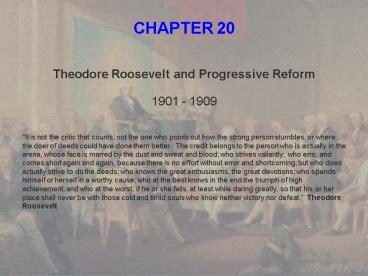Theodore Roosevelt and Progressive Reform - PowerPoint PPT Presentation
1 / 12
Title:
Theodore Roosevelt and Progressive Reform
Description:
... describe some of the reform accomplishments of the progressives at the local, ... Richard Nixon, Dwight David Eisenhower, George Washington, Abraham Lincoln, etc. ... – PowerPoint PPT presentation
Number of Views:255
Avg rating:3.0/5.0
Title: Theodore Roosevelt and Progressive Reform
1
CHAPTER 20
- Theodore Roosevelt and Progressive Reform
- 1901 - 1909
- It is not the critic that counts not the one
who points out how the strong person stumbles, or
where the doer of deeds could have done them
better. The credit belongs to the person who is
actually in the arena, whose face is marred by
the dust and sweat and blood who strives
valiantly who errs, and comes short again and
again, because there is no effort without error
and shortcoming but who does actually strive to
do the deeds who knows the great enthusiasms,
the great devotions who spends himself or
herself in a worthy cause who at the best knows
in the end the triumph of high achievement, and
who at the worst, if he or she fails, at least
while daring greatly, so that his or her place
shall never be with those cold and timid souls
who know neither victory nor defeat. Theodore
Roosevelt
2
Of course our whole national history has been
one of expansion. . . that the barbarians recede
or are conquered . . . is due solely to the power
of the mighty civilized races which have not lost
the fighting instinct. Theodore Roosevelt, The
Strenuous Life There was never the least
attention paid to what was cut up for sausages
there would come all the way back from Europe old
sausage that had been rejected, and that was
moldy and white it would be dosed with borax
and glycerine, and dumped into the hoppers, and
made over again for home consumption. There
would be meat that had tumbled out on the floor,
in the dirt and sawdust, where the workers had
tramped and spit uncounted billions of
consumption germs. There would be meat stored in
great piles in rooms and the water from leaky
roofs would drip over it, and thousands of rats
would race about on it. . . . These rats were
nuisances, and the packers would put poisoned
bread out for them, and they would die, and then
the rats, bread and meat would go into the
hoppers together. Upton Sinclair, The Jungle --
1906
3
Text Concepts
- National Womens Trade Union League
- J. P. Morgan
- Trustbusters
- Square Deal treat capital and labor equally
- Booker T. Washington to White House, 8 days later
Bill Morris burned at stake - W.E.B. Du Bois
- National Association for the Advancement of
Colored People NAACP - Roosevelt Corollary to the Monroe Doctrine
- Progressivism
- Interstate Commerce Commission
- Muckrakers Ida TJoharbell, Upton Sinclair,
Lincoln Steffens, Jacob Riis - Robert M. La Follette
- Muller v. Oregon Justice Brandeis
- Gifford Pinchot, John Muir, Sierra Club
4
Chapter Review
- Evaluate the presidency of Theodore Roosevelt
using 4 thesis concepts instead of 3 - Outline the changing status of women and children
at the turn of the century. - Give at least three reasons why Theodore
Roosevelt is called the first modern president. - Explain the major provisions of Roosevelts
Square Deal. - Briefly describe some of the reform
accomplishments of the progressives at the local,
state and national levels. - Briefly describe Theodore Roosevelts foreign
policy in his second term.
5
I. The Age of Theodore Roosevelt
- McKinleys assassination brings Theodore
Roosevelt to White House, which he uses as bully
pulpit - Arrival of more immigrants, rising divorce rate,
and women in school and workplace all contribute
to new look in America - America becomes a nation of consumers caught up
in the new advertising
6
- Race relations remain tense during Roosevelts
administration - Booker T. Washington accepted by many whites, but
nothing changes - Souths white primary is most effective means of
excluding blacks from political process - W.E.B. DuBois and followers articulate their
desire for changes
7
European Immigration
8
II. Roosevelt and the Modern Presidency The
First Term
- U.S. Steel is formed and threatens public
- Roosevelts reputation as trust buster
exaggerated - President pushes arbitration during coal strike
- Roosevelt clear about foreign policy goals
(Roosevelt Corollary, Central America canal) - Roosevelt takes election results as mandate to
move forward
9
(No Transcript)
10
III. Progressive Campaigns to Reform the Nation
- Federal government tries to police business
- Progressivism interpreted in different ways
- Muckrakers enter media coverage of events
- Reform efforts broadened to politics
- Regulation of business increases
- Reformers succeed in obtaining direct election of
senators
11
IV. Roosevelt and the Modern Presidency The
Second Term
- Hepburn Act brings railroad regulation
- Food and drug industries also regulated
- Roosevelt is active in foreign affairs
- Some challenge Roosevelts commitment to reform
- Supreme Court overturns some reform efforts
- Conservation is great success for Roosevelt
- Gifford Pinchot, John Muir
- Roosevelt keeps vow and does not run in 1908
12
Comparison
- Compare President Roosevelt to our current
president, George W. Bush. - Compare President Theodore Roosevelt to former
president Bill Clinton. - Compare President Theodore Roosevelt to previous
presidents you have studied previously Lyndon
Baines Johnson, his relative Franklin D.
Roosevelt, Richard Nixon, Dwight David
Eisenhower, George Washington, Abraham Lincoln,
etc.

